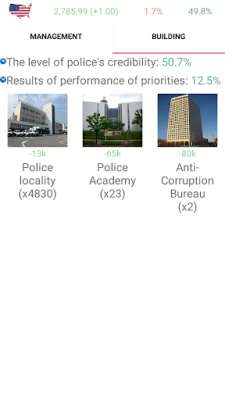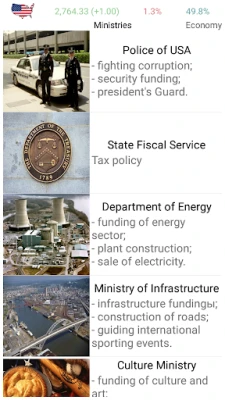
Latest Version
1.0.7
June 26, 2025
Oxiwyle
Games
Android
0
$0.49
com.gosoft.usapremium
Report a Problem
More About Simulator of USA Premium
Mastering Nation Management: A Comprehensive Guide to Strategic Gameplay
In the realm of strategic simulation games, players are often tasked with the intricate responsibility of managing a nation. This guide delves into the key features that define such games, offering insights into effective strategies for success. With a full map encompassing 163 countries across all continents, players can immerse themselves in a rich and diverse gameplay experience.
Key Features of Nation Management Games
Nation management games present a variety of engaging features that challenge players to think critically and strategically. Here are some of the core elements that define the gameplay:
1. Managing Eleven Ministries
One of the most crucial aspects of nation management is overseeing various ministries. Players must effectively manage eleven different ministries, each responsible for specific sectors of governance. This includes:
- Finance: Balancing the national budget and managing resources.
- Health: Ensuring the well-being of citizens through healthcare initiatives.
- Education: Investing in the future by improving educational systems.
- Defense: Protecting the nation from external threats.
- Infrastructure: Developing essential services and facilities.
2. Constructing Factories and Mines
Economic growth hinges on the establishment of factories and mines. Players must strategically decide where to build these facilities to maximize production and resource extraction. This not only boosts the economy but also creates job opportunities for citizens, fostering a sense of stability and growth.
3. Developing Agriculture
A strong agricultural sector is vital for sustaining a nation. Players should focus on enhancing agricultural practices, investing in technology, and ensuring food security. By doing so, they can improve the quality of life for their citizens and reduce dependency on imports.
4. Engaging in Warfare and Capturing Countries
Conflict is an inevitable part of nation management. Players may find themselves in situations where they must engage in warfare to protect their interests or expand their territory. Strategic planning and resource allocation are essential for successful military campaigns. Capturing countries can provide additional resources and strategic advantages.
5. Developing Service Sectors
Beyond agriculture and industry, a robust service sector is crucial for a balanced economy. Players should invest in services such as tourism, technology, and finance. This diversification not only enhances economic resilience but also improves the overall quality of life for citizens.
6. Choosing the Country's Development Path
Every decision made in the game influences the country's development trajectory. Players must carefully consider their choices, whether they lean towards industrialization, technological advancement, or social welfare. The path chosen will shape the nation's future and its standing on the global stage.
Ensuring Personal Safety and Fighting Corruption
As a leader, personal safety is paramount. Players must navigate the complexities of political landscapes while ensuring their own security. Additionally, combating corruption is essential for maintaining public trust. Implementing transparent policies and fostering accountability can help build a government that citizens believe in.
Building Trust with the People
Gaining the trust of the populace is a fundamental aspect of successful governance. Players should prioritize communication, transparency, and responsiveness to citizen needs. By actively engaging with the community and addressing their concerns, leaders can cultivate a loyal and supportive citizenry.
Conclusion: Good Luck, Mr. President!
In conclusion, mastering the art of nation management requires a multifaceted approach. From managing ministries and developing industries to engaging in warfare and building trust, every decision shapes the future of the nation. As you embark on this strategic journey, remember to prioritize safety, combat corruption, and earn the unwavering trust of your citizens. Good luck, Mr. President!
Rate the App
User Reviews
Popular Apps










Editor's Choice































